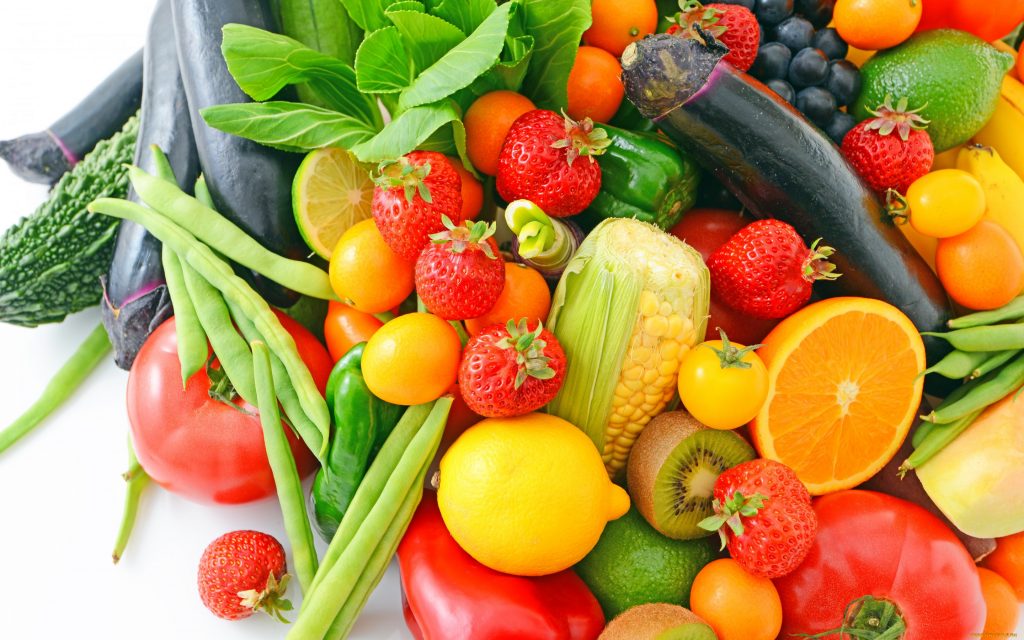Vitamins are essential for survival – we have to get them with food. What is the easiest way for vegans and vegetarians to do this? And which vitamins should you pay particular attention to?
For a vegan or vegetarian diet as well as for a diet with meat, it is helpful to know the different vitamins and their (vegetable) sources. Although healthy people in Germany are adequately supplied with most vitamins, there are also critical vitamins: These include vitamin B12 and vitamin D.
Vitamins: important for a healthy life

Vitamins are tiny molecules with a variety of functions and effects: they regulate the utilization of nutrients and are indispensable for energy production. Vitamins strengthen our immune system and are essential for building cells, blood cells, bones and teeth.
Individual vitamins can be involved in many different processes. Vitamins often work together and reinforce each other’s effects. It is all the more important that all vitamins are sufficiently absorbed.
Cover vitamin requirements with vegan nutrition
In order to cover as many vitamins as possible with a plant-based diet, you can observe the following tips:
Stick to the 5-a-day rule and eat at least three handfuls of vegetables (400 grams) and two handfuls of fruit (250 grams) a day.
Eat three servings of whole grains (e.g. 250 to 300 grams of cooked rice, 100 to 150 grams of bread) and potatoes (200 to 350 grams),
a serving of legumes (40 to 50 grams raw or 150 to 220 grams cooked) and
one to two servings of nuts and seeds (30 to 60 grams).
Pay attention to variety: the more colorful, the better.
Go out into the fresh air every day and – if possible – soak up some sunlight.
Seasonality ensures variety and a high nutrient content (see also the Utopia seasonal calendar).
Thanks to regionality, you get fresh, nutritious products without long transport routes.
Organic products have less pesticide residue and are better for the environment.
Ensure your supply of vitamin B12.
We cannot see or taste vitamins – and yet we need them to live. There are 13 known vitamins in total. They are divided into two groups: there are four fat-soluble and nine water-soluble vitamins.
The four fat-soluble vitamins
As the name suggests, the fat-soluble vitamins A, D, E and K need fat to be absorbed by the body. However, traces of fat are enough for this and it usually happens automatically: A bit of oil in a salad or for steaming vegetables and even the fat contained in wholemeal bread is enough. The fat-soluble vitamins can be stored in the body’s fat deposits.
Vitamin A
Vitamin A is involved in the visual process, has an influence on reproduction and thyroid activity, protects the skin and mucous membranes and is important for the immune system.
The foods in which the nutrient is found are easy to remember: in yellow, green, orange and red vegetables. You can cover your daily needs with 100 to 200 grams of lamb’s lettuce, a large carrot, a pepper, 150 grams of kale or spinach. Pumpkin, broccoli and corn also contain vitamin A.
Vitamin D
Vitamin D promotes the absorption of calcium and phosphorus, is involved in the formation of bones and teeth and has an impact on muscle strength. It is a very special vitamin – because the body can produce it itself from precursors that are already present in the body: Most of our needs can be covered with the help of sunlight (UV-B light).
According to the Federal Institute for Risk Assessment (BfR), anyone who exposes a quarter of their body surface (face, hands and parts of the arms and legs) to the sun for 5 to 25 minutes a day can cover their daily needs in Germany, at least in the summer months.
Only a small part (10 to 20 percent) of the requirement has to be obtained from the diet. Vitamin D is found in very few foods – most are of animal origin. But there are also plant sources: Mushrooms such as porcini, chanterelles or button mushrooms contain vitamin D.
vitamin E
Vitamin E is a component of all membranes and has various antioxidant effects – for example, it protects fats and fatty acids from the harmful effects of oxygen compounds.
It is mainly found in vegetable oils such as wheat germ oil, walnut oil or sunflower oil. But also in nuts such as hazelnuts, almonds or seeds such as linseed. The daily requirement can be covered with 50 grams of hazelnuts, two spoons of sunflower oil or a teaspoon of wheat germ oil.
vitamin k
Vitamin K is involved in the formation of bones and blood clotting factors. It is found in green vegetables such as Brussels sprouts, spinach, lettuce, chard, broccoli, kale, Brussels sprouts or lamb’s lettuce. But also corn oil, olive oil, whole grains, sauerkraut contain the nutrient and 120 grams of potatoes, 400 grams of mushrooms, 15 grams of chives or 130 grams of asparagus cover the daily requirement.
The nine water-soluble vitamins
In addition to the fat-soluble vitamins, there are the water-soluble vitamins: these include all B vitamins and vitamin C. In contrast to the fat-soluble vitamins, the water-soluble vitamins cannot be stored in the body and must therefore be taken in regularly.
Vitamin B1 (thiamine)
Vitamin B1 – also known as thiamine – is involved in energy and carbohydrate metabolism and the transmission of stimuli in the nervous system. Thiamine is found in the outer layers of grains and is therefore found in whole grain products. It is also found in potatoes, sunflower seeds, soybeans, sesame, peas, rice and oatmeal. 300 grams of peas, 200 grams of whole grain rice or oatmeal or 200 grams of whole grain flour can cover your daily requirement.
Vitamin B2 (Riboflavin)
Vitamin B2 – or riboflavin – is involved in protein and energy metabolism and is important for growth and development. It is found in yeast, almonds, soybeans, mushrooms, whole grains or broccoli, asparagus and spinach. 200 grams of almonds, 250 grams of mushrooms, 375 grams of pumpkin seeds, 400 grams of soy meat, 450 grams of dried lentils, 700 grams of wholemeal flour or 650 grams of cooked broccoli correspond to the daily requirement.
Niacin
Niacin, also known as vitamin B3, is involved in energy, protein, fat and carbohydrate metabolism. Your daily requirement can be covered with 25 grams of peanuts and 100 grams of fried oyster mushrooms or 250 grams of whole wheat. Niacin is found in peanuts, cashews, mushrooms, wheat bran, dates, whole grains, legumes, roasted coffee beans or potatoes.
Vitamin B6
Like all B vitamins, vitamin B6 (pyridoxine) is involved in metabolism. It plays an important role in protein metabolism in particular. The nutrient is found in whole grain products, potatoes, walnuts, sunflower seeds, bananas, legumes or soybeans. 45 grams of sprouts, 150 grams of rolled oats, 130 grams of soybeans or 300 grams of potato or carrot salad refined with a handful of walnuts are enough to cover your needs.
Folic Acid (Folate)
The human body needs folic acid for blood formation, growth and development. Pregnant and breastfeeding women in particular should ensure that they are adequately supplied. The average daily requirement can be covered by 40 grams of sprouts, 400 grams of green vegetables, 150 grams of soybeans, 200 grams of chickpeas or 300 grams of kale. Folic acid is found in green leafy vegetables such as spinach, types of cabbage, whole grain products, parsley, cereal germs and bran, yeast or potatoes, legumes such as soybeans, lentils or chickpeas.
Pantothenic Acid (Vitamin B5)
Pantothenic acid is important for all build-up and breakdown reactions in the body. The vitamin is found in lentils, beans, celery, yeast, mushrooms, peanuts, rice and whole grains. The daily requirement can be covered, for example, by 200 grams of porcini mushrooms, 400 grams of wholemeal rye flour, 300 grams of rice, 300 grams of beans or celery.
Biotin (Vitamin B7)
We depend on biotin: It is a component of important enzymes and is important for skin and hair. We can absorb it from yeast, peanuts, oatmeal, brown rice, peas, spinach, lentils. Our daily requirement corresponds to around 500 grams of apples, 85 grams of soybeans, 150 grams of walnuts or 700 grams of beans.
Vitamin B12 (cobalamin)
The human body needs vitamin B12 – or cobalamin – for blood formation and for building up the cell core substance. It is formed by microorganisms and is found in animal foods such as meat, offal, eggs and dairy products. Vitamin B12 is a problematic nutrient, especially for vegans: although fermented foods such as sauerkraut, algae, beer and seedlings are said to contain cobalamin, they are not considered reliable sources. To counteract a vitamin B12 deficiency, vegans and possibly vegetarians should take supplements or use fortified foods or toothpaste.
Vitamin C (ascorbic acid)
Ascorbic acid has many functions: It is involved in tooth, bone, connective tissue and blood formation. It helps to heal wounds and injuries, improves iron absorption from food, has an antioxidant effect and performs functions in the immune system.
Vitamin C is found in particularly large amounts in rose hips, sea buckthorn, peppers and berries such as black currants. 100 grams of fennel, 80 grams of broccoli or Brussels sprouts, 250 grams of chard or leeks, 200 grams of spinach or kohlrabi or 130 grams of cauliflower cover the daily requirement.
Vitamins are delicate

Many vitamins are sensitive to light and oxygen. Some are also sensitive to heat and washing. Still other vitamins can be better absorbed by the body when heated than raw. Not all sensitivities can be observed for every food or vitamin – but with these tricks you can ensure that your food has the highest possible vitamin content:
Store food as cool, dark and dry as possible
wash only briefly and uncut,
stew and steam rather than cook for a long time,
Use cooking water for sauces and
Eat fruit and vegetables both fresh and heated.





